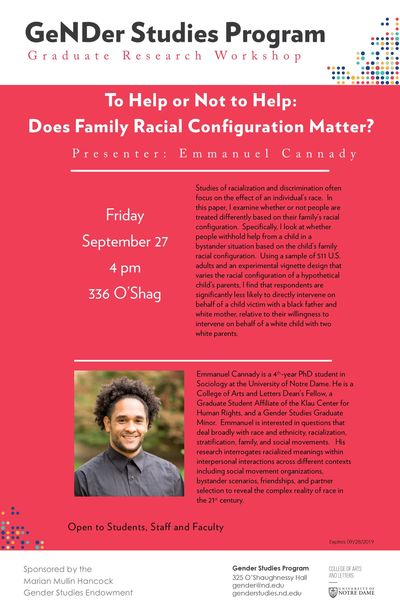
Studies of racialization and discrimination often focus on the effect of an individual’s race. In this paper, I examine whether or not people are treated differently based on their family’s racial configuration. Specifically, I look at whether people withhold help from a child in a bystander situation based on the child’s family racial configuration. Using a sample of 511 U.S. adults and an experimental vignette design that varies the racial configuration of a hypothetical child’s parents, I find that respondents are significantly less likely to directly intervene on behalf of a child victim with a black father and white mother, relative to their willingness to intervene on behalf of a white child with two white parents. I also find that respondents are significantly less likely to intervene on behalf of a child with a black father, regardless of the mother’s race. This paper provides evidence for a theory of racialization that considers how parents’ racial configuration—and in particular the father’s race—can produce different life outcomes for their children. I conclude by discussing implications for understanding how race operates in contemporary society in the context of small-group affiliations.
Gender Studies Graduate Research Workshop
"To Help or Not to Help: Does Family Racial Configuration Matter?"
Presenter: Emmanuel Cannady, PhD student in Sociology and Gender Studies Graduate Minor
Friday, September 27
4pm
336 O'Shaughnessy

Emmanuel Cannady is a 4th-year PhD student in Sociology at the University of Notre Dame. He is a College of Arts and Letters Dean’s Fellow, a Graduate Student Affiliate of the Klau Center for Human Rights, and a Gender Studies Graduate Minor. Emmanuel is interested in questions that deal broadly with race and ethnicity, racialization, stratification, family, and social movements. His research interrogates racialized meanings within interpersonal interactions across different contexts including social movement organizations, bystander scenarios, friendships, and partner selection to reveal the complex reality of race in the 21st century. Emmanuel's dissertation examines the interactions between social movement activists within a Black Lives Matter organization, community members, other organizations, and the local government. He is also researching the relationship between people’s reported closeness to their family and their likeliness to have an interracial marriage and is the primary investigator on a community-based collaborative project researching the effects of poverty and community divestment in South Bend, IN.
Before joining the University of Notre Dame Sociology Department, Emmanuel was an Assistant Director in the Gender Relations Center and held an Adjunct Faculty appointment at the University of Notre Dame. He holds an MSEd in Student Affairs Administration in Higher Education and a BS in Mathematics both from the University of Wisconsin-La Crosse.